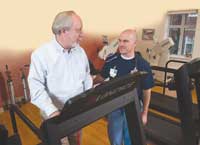Support the Health of Medical Students
Surprisingly, some of the biggest sources of stigma surrounding physical and mental health issues for medical students come from within the medical community itself. Most teaching physicians have witnessed or been aware of medical students’ concerns about the following:
- Residents and attendings discussing, within earshot of classmates, a student’s health problems or absence from work because of an illness;
- Potential jeopardy to a student’s academic status if school administration were to learn of a specific health problem;
- Postponement of medical/psychiatric care due to clinical schedules and difficulty arranging for time off;
- Potential privacy violations when treating clinicians have grading or supervisory roles in students’ lives;
- Difficulties in arranging for continuity of care when students are scheduled for an ‘away’ rotation;
- Classmates being asked to shoulder call or other burdens if a student takes a leave; or
- Faculty or students who don’t know where to turn when health concerns arise, often leaving them to go directly to school administrators.
The desire to distance oneself from illness can often lead to denial of health issues among medical students. This denial exists despite the fact that, according to a 2010 Journal of the American Medical Assoc. study, between 14{06cf2b9696b159f874511d23dbc893eb1ac83014175ed30550cfff22781411e5} and 33{06cf2b9696b159f874511d23dbc893eb1ac83014175ed30550cfff22781411e5} of medical students acknowledge significant depression, and depressed students are often sensitive to the stigma associated with being recognized by their peers, teachers, and clinical caregivers as suffering from depression.
At the institutional level, this minimization and denial can lead to a culture of ill-informed faculty with insufficient knowledge of how to engage or assist potentially affected students, inadequately funded campus health services, and other barriers to appropriate care.
Individually, physicians can help students secure the time off to attend to medical care in all its needed forms. We can seek to minimize, where possible, the conflicting roles of teacher and treating clinician when dealing with medical students. We can adhere to the confidentiality of all medical information, especially when it is about one of our own students.
Because it’s often more beneficial to have the power of a committed medical community behind these issues, we can be aware of the extant services on our campuses and press for adequate funding for treatment, outreach, and education. When the need for services exceeds the resources available at a medical school, we can call upon Physician Health Services (PHS) to help assist any medical student in the Commonwealth.
Utilizing these strategies, we can be aware of and lessen the stigma that many of our medical students face. We can hope they will ultimately bring a less-stigmatized physician to the care of their future patients.
Dr. Ruthann Rizzi is associate director of Physician Health Services, a program of the Mass. Medical Society (MMS). This article first appeared in Vital Signs, a publication of the MMS.

